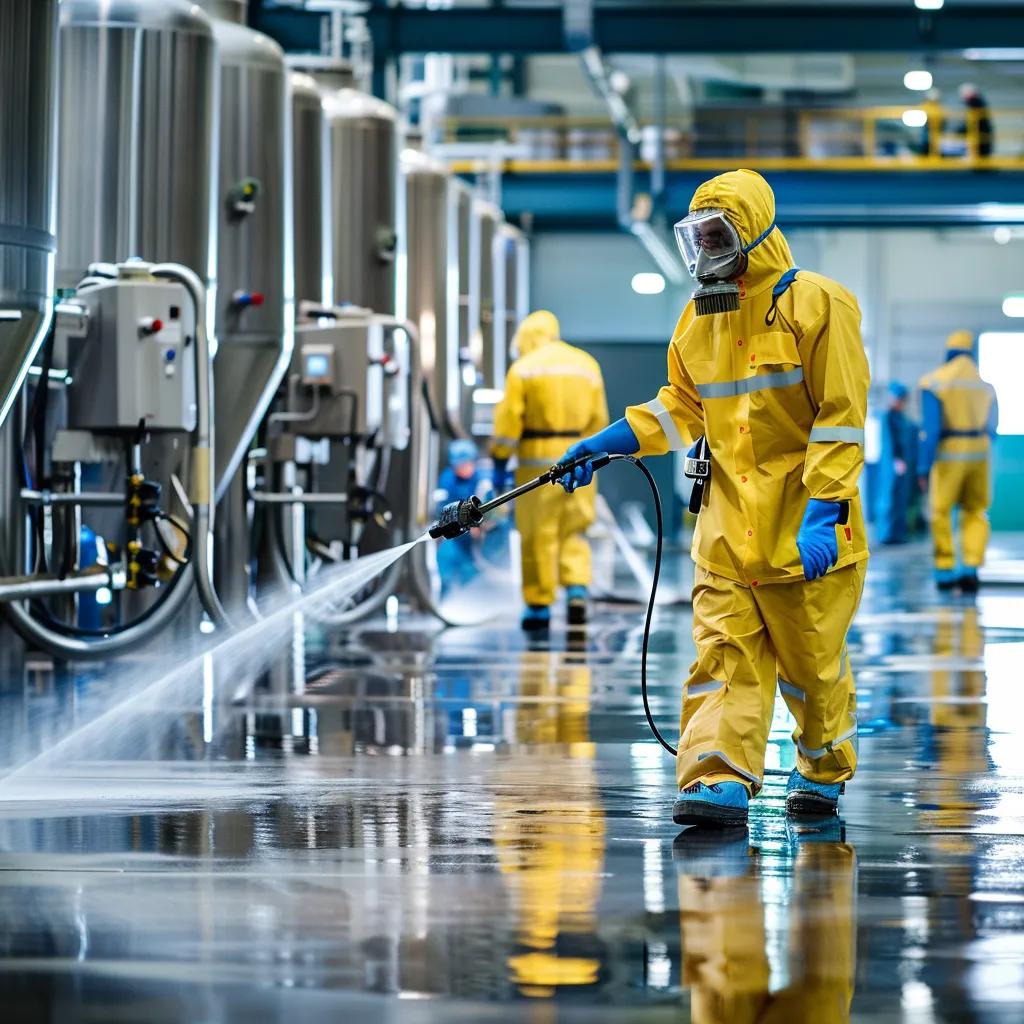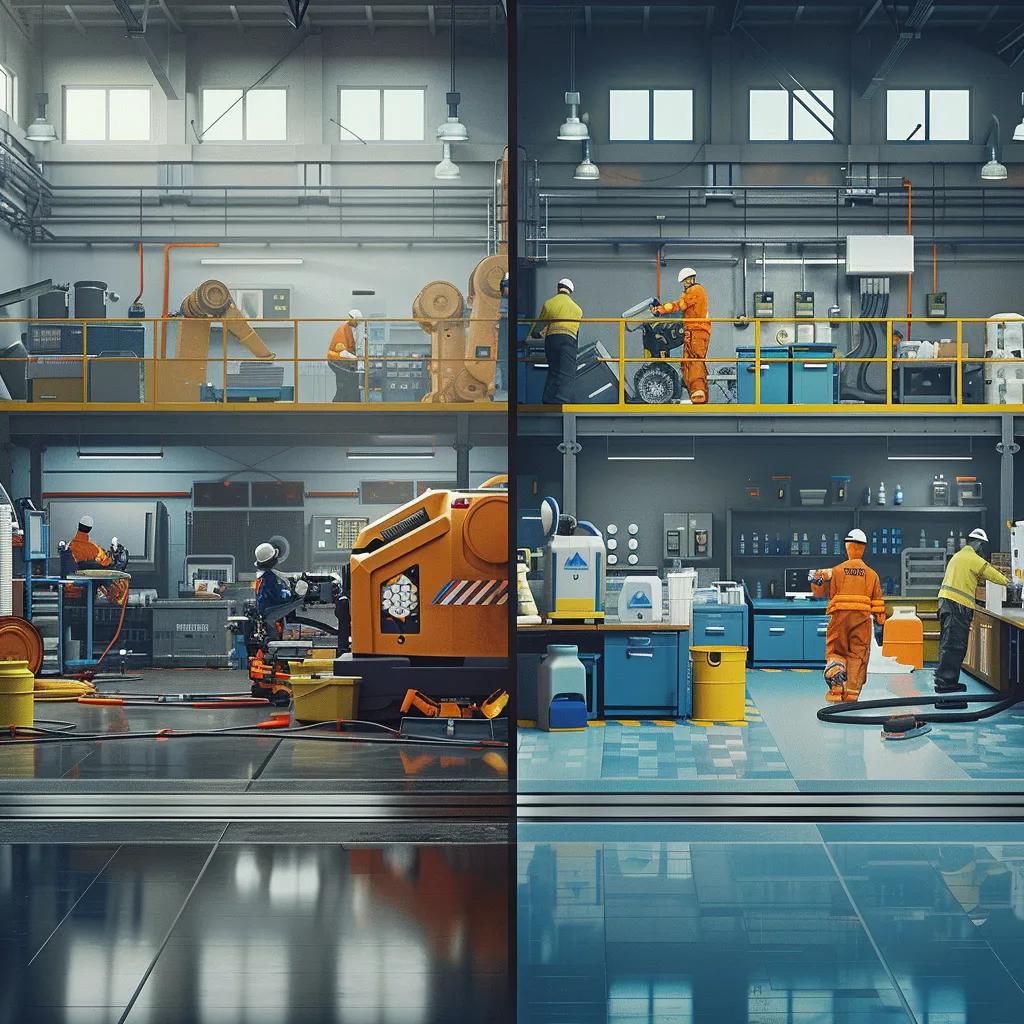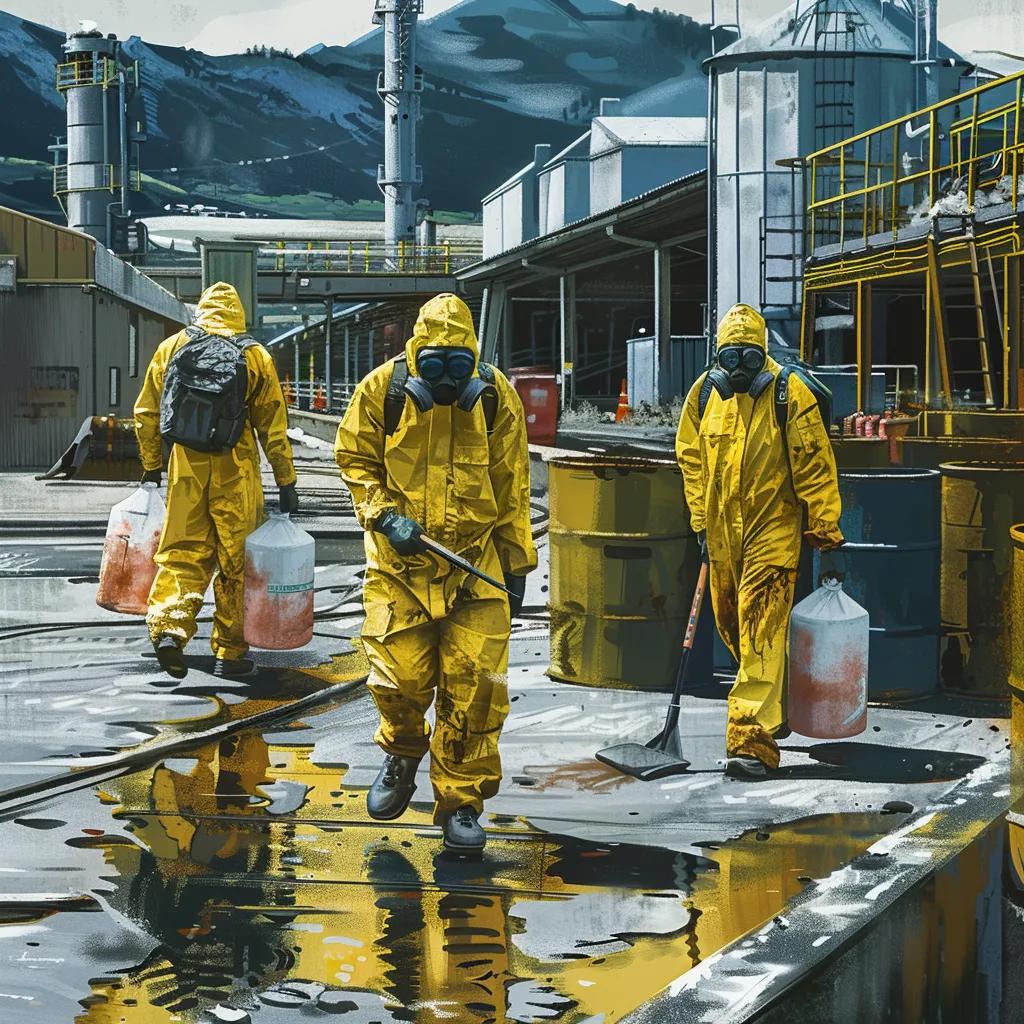
Specialized Cleaning Solutions for Industrial Facilities: Expert Services for Safe and Compliant Workspaces

Reducing contamination-related shutdowns by up to 25% starts with targeted industrial cleaning strategies that remove heavy soils, control hazards, and ensure regulatory compliance. In this guide, you’ll learn how specialized cleaning solutions for industrial facilities combine advanced techniques, tailored equipment, and expert protocols to keep manufacturing plants, warehouses, food processing lines, and medical or educational sites safe and efficient. We’ll define what sets industrial cleaning apart, explore McCoy Maintenance’s comprehensive service offerings, outline safety and compliance measures, detail applications by facility type across Macomb, Oakland, and Metro Detroit, and highlight the business benefits of choosing a local, authority-driven partner.
Main Themes Covered:
- What specialized industrial cleaning entails and why it matters
- McCoy Maintenance’s service portfolio: deep cleaning, pressure washing, hazardous cleanup, disinfection
- Safety standards and eco-friendly practices under OSHA and industry regulations
- Facility-specific cleaning approaches for manufacturing, warehousing, food processing, medical, and educational sites
- Value propositions: customized plans, advanced equipment, case studies, and local responsiveness
What Are Specialized Cleaning Solutions for Industrial Facilities?
Specialized cleaning solutions for industrial facilities combine targeted chemistry, high-performance equipment, and trained technicians to remove heavy machinery residue, grease, and biohazards, thereby boosting safety and operational uptime. Unlike basic janitorial services, these solutions address complex soils in production environments through industrial-grade detergents, high-pressure systems, and precision disinfection. By integrating deep floor scrubbing, overhead dust removal, and equipment degreasing, facility managers achieve consistent hygiene levels and regulatory compliance without interrupting critical processes.
How Does Industrial Cleaning Differ from Commercial Cleaning?

Industrial cleaning focuses on removing industrial contaminants—such as metal shavings, oil, and chemical residues—from large-scale production areas, while commercial cleaning typically targets aesthetics and surface upkeep in offices and retail spaces.
- Industrial cleaning uses heavy-duty degreasers and pressure washers designed for machinery and concrete decks.
- Technicians follow rigorous safety protocols for confined spaces, high elevations, and hazardous materials.
- Workflow integration ensures minimal downtime in continuous-operation facilities.
Each distinction underscores why specialized training and equipment are essential, leading us to identify which facility types require these focused services.
What Types of Industrial Facilities Require Specialized Cleaning?
Industrial environments span a range of facility types where standard cleaning falls short: commercial cleaning.
- Manufacturing Plants – Production lines generate metal dust, lubricants, and particulate matter.
- Warehouses & Distribution Centers – Forklift traffic, palletized storage, and dock loading areas accumulate heavy soils and debris.
- Food & Beverage Processing – Hygiene mandates demand rigorous sanitation to prevent cross-contamination and microbial growth.
- Medical & Educational Institutions – Laboratories, clinics, and campus facilities require disinfection protocols beyond typical custodial routines.
These varied settings share a need for precise removal of industrial byproducts, which directly informs tailored cleaning approaches.
Why Is Specialized Cleaning Critical for Industrial Environments?
Effective specialized cleaning enhances workplace safety, prevents equipment breakdowns, and upholds compliance with OSHA and industry-specific regulations. By eliminating slip-and-fall hazards, controlling airborne particles, and neutralizing chemical residues, facilities reduce accident rates and extend machinery life cycles. Moreover, rigorous cleaning programs support operational efficiency by minimizing unplanned stoppages—setting the stage for a deeper look at McCoy Maintenance’s service offerings.
Which Industrial Cleaning Services Does McCoy Maintenance Offer?
What Are Industrial Deep Cleaning Services and Their Benefits?
Industrial deep cleaning targets embedded grime and hard-to-reach areas using specialized equipment and industrial-strength solutions.
- Floor Scrubbing & Sealing: Heavy-duty ride-on scrubbers remove oil and particulate; sealing prevents future infiltration.
- High-Level Dusting: Powered lifts and HEPA vacuums clear rafters and ductwork to improve air quality.
- Equipment Degreasing: Steam and chemical techniques dissolve caked-on lubricants to maintain machine performance.
These processes reduce maintenance costs, enhance indoor air quality, and support uninterrupted production.
How Do Specialized Cleaning Methods Like Pressure Washing and Sandblasting Work?
Industrial pressure washing and sandblasting use high-velocity streams and abrasive media to dislodge tough residues from surfaces and equipment. Commercial cleaning
| Entity | Attribute | Value |
|---|---|---|
| Pressure Washer | Operating Pressure | Up to 5,000 PSI for concrete and metal surfaces |
| Sandblasting Unit | Abrasive Media | Glass beads or aluminum oxide for rust and scale |
| Cleaning Outcome | Result | Restoration of surface integrity and friction reduction |
These targeted, high-force methods remove tenacious soils quickly and prepare surfaces for inspections or coatings, paving the way for safe material handling.
How Is Hazardous Material Cleanup Managed Safely?

Hazardous cleanup involves containment, neutralization, and disposal of toxic substances in accordance with EPA and OSHA protocols. McCoy Maintenance employs:
- Hazard Assessment: Identifying chemical properties and required personal protective equipment (PPE).
- Containment Systems: Temporary barriers and HEPA-filtered vacuums to prevent cross-contamination.
- Licensed Disposal: Coordination with certified waste haulers for compliant removal of chemicals and sludge.
By following strict protocols, facility managers mitigate liability and maintain uninterrupted operations while safeguarding staff health.
What Role Does Electrostatic Disinfection Play in Industrial Cleaning?
Electrostatic disinfection applies charged disinfectant droplets that uniformly wrap around equipment, walls, and hard-to-reach areas to achieve up to 99.99% microbial reduction. This technology:
- Increases coverage compared to manual spraying.
- Shortens contact time for rapid space turnaround.
- Integrates seamlessly into routine maintenance schedules.
Electrostatic systems protect sensitive manufacturing processes, food processing lines, and educational or medical environments where stringent hygiene is non-negotiable.janitorial services
Electrostatic Disinfection Effectiveness
Electrostatic disinfection is a method that applies charged disinfectant droplets to uniformly cover surfaces, achieving up to 99.99% microbial reduction. This technology is particularly effective in environments where stringent hygiene is crucial, such as medical facilities and food processing lines.
This citation supports the article’s claims about the effectiveness of electrostatic disinfection.
How Does McCoy Maintenance Ensure Safety and Regulatory Compliance?
What Are OSHA Compliance Requirements for Industrial Cleaning?
OSHA standards for industrial cleaning include:
- Hazard Communication (1910.1200): Proper labeling and training on chemical hazards.
- Personal Protective Equipment (1910.132–1910.138): Mandatory use of gloves, respirators, and eye protection.
- Confined Space Entry (1910.146): Permits and rescue plans for enclosed areas such as silos or tanks.
OSHA Standards for Industrial Cleaning
OSHA sets standards for industrial cleaning to ensure workplace safety, including hazard communication, the use of personal protective equipment, and confined space entry protocols. These regulations aim to reduce workplace incidents and align cleaning operations with federal safety mandates.
This citation supports the article’s claims about OSHA compliance requirements for industrial cleaning.
Which Safety Protocols Are Followed During Industrial Cleaning?
- Lockout/Tagout Procedures for de-energizing machinery before cleaning.
- Fall Protection Systems when working at heights on catwalks or mezzanines.
- Air Monitoring to detect hazardous vapors in enclosed spaces.
These measures protect technicians and facility staff, ensuring each cleaning operation proceeds without compromising health or productivity.
How Are Eco-Friendly and Sustainable Cleaning Solutions Integrated?
- Biodegradable Detergents that break down without harming wastewater systems.
- Chemical Dilution Controls to optimize concentration and reduce product usage.
- Recyclable Packaging for cleaning supplies to lower landfill impact.
Sustainable approaches uphold environmental regulations, support corporate responsibility goals, and elevate the facility’s public image.
Optimized Industrial Cleaning for Facility Safety & Efficiency
How Are Manufacturing Plants Cleaned to Meet Industry Standards?
Manufacturing environments require removal of metal fines, oil residue, and particulate matter to prevent machinery wear and preserve product quality. Deep floor cleaning and precision degreasing:
- Protect conveyors, presses, and stamping machinery.
- Improve lubrication effectiveness and reduce overheating risks.
Customized maintenance intervals align with production cycles, minimizing downtime. office cleaning services
What Are the Best Practices for Warehouse and Distribution Center Cleaning?
- Daily Sweeping & Debris Removal prevents trip hazards.
- Periodic Floor Scrubbing reduces dust accumulation and enhances forklift traction.
- Racking Disinfection controls mold in climate-controlled storage.
These practices streamline inventory handling and support occupational safety.
How Is Food Processing Plant Cleaning Specialized for Hygiene and Safety?
Food processing facilities demand sanitization protocols that prevent microbial contamination and allergen cross-contact:
| Entity | Attribute | Value |
|---|---|---|
| Sanitation Method | Chemical Type | Quaternary ammonium for bacteria control |
| Contact Time | Dwell Duration | 5–10 minutes per surface to ensure efficacy |
| Verification | ATP Testing | Immediate readouts for microbial residue levels |
Strict separation of raw and finished product zones, along with validation testing, ensures compliance with FDA and USDA guidelines.
What Cleaning Services Are Provided for Medical and Educational Facilities?
- Electrostatic Disinfection to eradicate pathogens on high-touch surfaces.
- HEPA Vacuuming in laboratories and classrooms to control airborne particles.
- Specialty Floor Coatings that withstand frequent cleaning and chemical exposure.
These measures protect occupant health and meet accreditation standards.
How Does Local Expertise Benefit Clients in Macomb and Oakland Counties?
Proximity to Metro Detroit facilities allows McCoy Maintenance to deliver rapid response times, personalized service plans, and in-depth knowledge of regional regulations. Local technicians understand seasonal challenges—such as winter salt residues—and collaborate with facility managers to schedule work around peak production periods, ensuring minimal disruption. For more information, visit
McCoy Maintenance.
What Are the Benefits of Choosing McCoy Maintenance for Industrial Cleaning?
How Do Customized Cleaning Plans Improve Facility Operations?
Tailored schedules and scope adjust to your facility’s production rhythms, ensuring cleaning frequency matches contamination levels. By aligning service windows with off-peak hours and critical production milestones, customized plans maximize asset uptime and coordinate seamlessly with in-house maintenance teams.
How Does Specialized Equipment Enhance Cleaning Effectiveness?
Advanced machinery—such as automated floor scrubbers, industrial-grade steam cleaners, and electrostatic sprayers—enables deeper soil removal with reduced labor intensity. Integrating sensor-driven dilution systems ensures consistent chemical application, maximizing cleaning efficacy while controlling costs.
What Client Testimonials and Case Studies Demonstrate Our Expertise?
Through documented case studies—such as a 40% reduction in safety incidents at a Macomb County manufacturing plant—
showcases measurable improvements in cleanliness, compliance, and operational efficiency. Client testimonials highlight responsiveness, adherence to budgets, and the reliability of local technicians.
What Are Common Questions About Specialized Industrial Cleaning?
How Often Should Industrial Facilities Be Professionally Cleaned?
Service intervals vary by facility type and contamination load but typically range from daily spot-cleaning in high-traffic zones to quarterly deep-cleaning cycles for production lines. Establishing a baseline inspection and adjusting frequency based on audit findings ensures consistency.
What Are the Key Differences Between Industrial and Commercial Cleaning Services?
Industrial cleaning handles heavy soils, machinery residues, and regulated waste streams with industrial detergents and specialized equipment, whereas
focuses on surface upkeep in offices and public areas using consumer-grade products. This distinction underpins the need for trained staff and safety protocols in industrial settings.
Why Is Compliance Important in Industrial Cleaning?
Regulatory compliance—such as OSHA hazard communication and EPA waste disposal guidelines—protects employees from exposure, reduces legal risk, and supports facility audits. Consistent adherence enhances corporate reputation and ensures uninterrupted operations.
How Does McCoy Maintenance Handle Emergency or Hazardous Cleanups?
Emergency response teams are dispatched rapidly to contain spills, neutralize hazards, and restore safe conditions. Certified technicians follow preapproved protocols, deploy rapid-deployment containment booms or absorbents, and coordinate with regulatory agencies for timely remediation.
How Can Businesses Request a Quote or Schedule Services?
Facility managers can submit an online service inquiry at mccoymaintenance.com/contact or call our local Metro Detroit office at (248) 555-1234 to arrange an on-site assessment and receive a customized proposal within 24 hours.
How Does McCoy Maintenance Support Industrial Cleaning in Macomb, Oakland, and Metro Detroit?
What Areas Are Covered by Our Industrial Cleaning Services?
McCoy Maintenance serves all major industrial zones in Macomb County, Oakland County, and the broader Metro Detroit area, including Sterling Heights, Troy, Warren, and Auburn Hills.
How Can Clients Contact McCoy Maintenance for Specialized Cleaning Solutions?
Clients can reach our customer care team via phone at (248) 555-1234, email at [email protected], or by completing the request form at mccoymaintenance.com/contact to schedule assessments or discuss service plans.
Benefits of Local Industrial Cleaning Providers
Local industrial cleaning providers offer advantages such as faster mobilization, personalized account management, and a deeper understanding of regional regulations. This proximity allows for proactive maintenance strategies and ongoing consultation, benefiting facilities in the Metro Detroit area.
This citation supports the article’s claims about the advantages of using local industrial cleaning providers.
McCoy Maintenance’s specialized industrial cleaning solutions combine advanced methods, strict safety compliance, and local expertise to create clean, productive, and regulation-ready workspaces across Metro Detroit. Partner with us to safeguard your workforce, extend equipment life, and maintain uninterrupted operations through tailored cleaning programs. Contact McCoy Maintenance today to schedule your assessment and experience the difference that focused industrial expertise can make.
